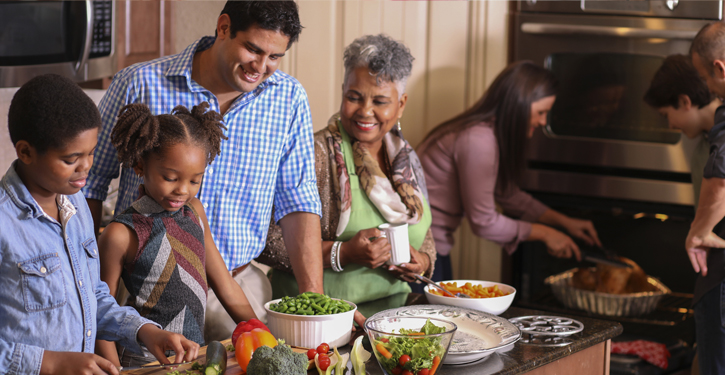Who doesn’t love a home cooked meal? Whether you’re the chef or just there to lick the spoon, spending time in the kitchen with loved ones is special, especially during the holidays. The last thing you want interrupting your family time is a kitchen fire.
Here are three types of kitchen fires and what to do if they occur.
Oil fires
- Deep fried turkey has become a popular dish over the years but can pose a threat—an oil fire. Consider these tips for preventing and dealing with oil fires no matter what you’re cooking:
- Don’t go overboard on the oil: Remember that the oil will be displaced when you add your ingredients. Add it sparingly to avoid it dripping onto the burner and catching fire.
- Never fry frozen foods: Ice can cause oil to splatter when they make contact.
- Don’t drop food in: Gently place food in the oil to avoid splashing.
- Stay vigilant: Don’t leave food frying unattended.
NEVER USE WATER: If an oil fire does occur, do not try to put it out with water. That will only cause it to spread. Instead, turn off the heat source and (if able) cover the pan with a metal lid. You can also douse the flames in a large amount of baking soda or salt. If you are unable to do any of the previous suggestions, use a fire extinguisher that is compatible with grease fires (most commonly class B and K extinguishers).
Stove fires
Well, you walked away for two seconds (right?) and now there is a fire on your stove. The first thing to remember is not to panic. The second is to turn off the burner. Like oil fires, you want to smother the flame. Avoid pouring water onto your stove or moving the pan. Both actions can cause the fire to spread. If you are unable to cover the pan with a metal lid or baking sheet, use a fire extinguisher immediately.
Oven or microwave fires
If a fire erupts in your oven or microwave, the best thing to do is to turn off the appliance and keep the door shut. Opening the door will only introduce more oxygen to the fire and can cause it to get out of hand fast. Keep an eye on the fire, but do not attempt to remove or clean anything until it has died out and the appliance has cooled.
Being prepared matters. Having the right insurance for your home can help you navigate the unexpected. For assistance with all your homeowners coverage needs, contact an insurance professional at Westwood Insurance Agency today. We’re here to help!





